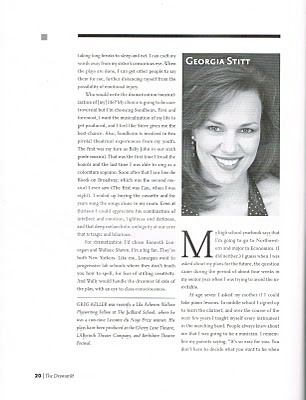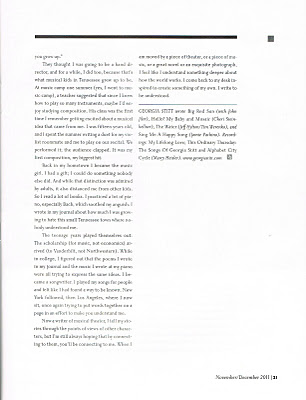I got asked to write a little blurb for The Dramatist Magazine. The Dramatists Guild is one of my very favorite organizations because they exist to support writers. Many of the people I respect most in this business are the people who are on the DG Council, the great playwrights and composers and lyricists of our time. Getting to write for the magazine felt very much to me like finally getting to sit at the grown-ups table.
The assignment was to choose one of these three questions and answer it.
1) Was there a play/theatrical experience that changed your life?
2) Why are you a writer?
3) Who would you choose to write the dramatization/musicalization of your life?
I chose number 2. Here ya go.
WHY ARE YOU A WRITER?
By Georgia Stitt
My high school yearbook says that I’m going to go to Northwestern and major in Economics. (I did neither.) I guess when I was asked about my plans for the future, the question came during the period of about four weeks in my senior year when I was trying to avoid the inevitable.
At age seven I asked my mother if I could take piano lessons. In middle school I signed up to learn the clarinet, and over the course of the next few years I taught myself every instrument in the marching band. People always knew about me that I was going to be a musician. I remember my parents saying, “It’s so easy for you. You don’t have to decide what you want to be when you grow up.”
They thought I was going to be a band director, and for a while, I did too, because that’s what musical kids in Tennessee grew up to be. At music camp one summer (yes, I went to music camp), a teacher suggested that since I knew how to play so many instruments, maybe I’d enjoy studying composition. His class was the first time I remember getting excited about a musical idea that came from me. I was fifteen years old, and I spent the summer writing a duet for my violist roommate and me to play on our recital. We performed it; the audience clapped. It was my first composition, my biggest hit.
Back in my hometown I became the music girl. I had a gift; I could do something nobody else did. And while that distinction was admired by adults, it also distanced me from other kids. So I read a lot of books. I practiced a lot of piano, especially Bach, which soothed my anguish. I wrote in my journal about how much I was growing to hate this small Tennessee town where nobody understood me.
The teenage years played themselves out. The scholarship (for music, not economics) arrived (to Vanderbilt, not Northwestern). While in college, I figured out that the poems I wrote in my journal and the music I wrote at my piano were all trying to express the same ideas. I became a songwriter. I played my songs for people and felt like I had found a way to be known. New York followed, then Los Angeles, where I now sit, once again trying to put words together on a page in an effort to make you understand me.
Now a writer of musical theater, I tell my stories through the points of views of other characters, but I’m still always hoping that by connecting to them, you’ll be connecting to me. When I am moved by a piece of theater, or a piece of music, or a great novel or an exquisite photograph, I feel like I understand something deeper about how the world works. I come back to my desk inspired to create something of my own. I write to be understood.

